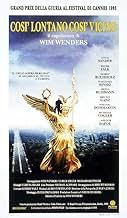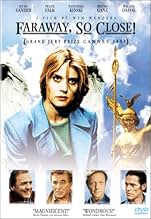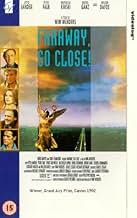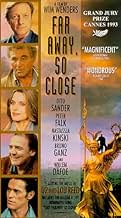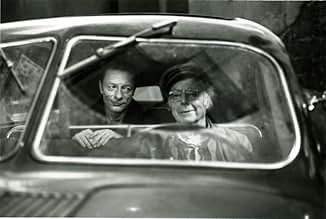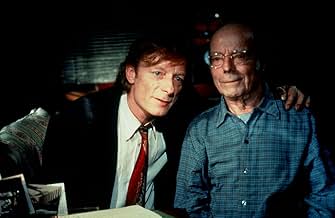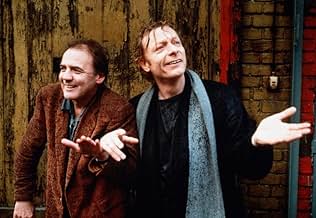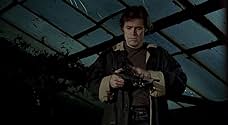AVALIAÇÃO DA IMDb
7,2/10
9,6 mil
SUA AVALIAÇÃO
Um grupo de anjos na capital alemã olha longamente para a vida dos seres humanos.Um grupo de anjos na capital alemã olha longamente para a vida dos seres humanos.Um grupo de anjos na capital alemã olha longamente para a vida dos seres humanos.
- Direção
- Roteiristas
- Artistas
- Prêmios
- 4 vitórias e 7 indicações no total
Mikhail Gorbachev
- Mikhail Gorbachev
- (as Michail S. Gorbatschow)
Avaliações em destaque
This film is about passion. A flicker on the eyes of an angel, our brief lives are as unique and intense as they are ephemeral, and time itself is the fire that burn our passions and desires. Complex and multicultural, the film is disturbingly deep as it is light, a contrast of innocence and evil, showing how the Faust compromise can be present and right/wrong can become difficult to define. Also, the participation of Lou Reed and Peter Falk as themselves bring Faust to reality, as a mirror to ourselves. The deeply german Wenders pay a compliment to Gorbatchev for the fall of the Wall, maybe telling us the duality of time, that can be good and evil like the faces of a coin. Wonderful piece of art.
10Cassiel
Although it has received mixed reviews by critics, this follow-up to "Der Himmel über Berlin" (1987) is a deeply moving and beautiful film. Wenders explores the polarities which exist in a newly unified Berlin and in so doing examines some of the polarities which exist in life itself. As "Cassiel," Otto Sander has given us another endearing Wenders protagonist who learns all too quickly about what life (and time) can present upon an individual. Laurent Petitgand's stunning musical score enhances the sublime images photographed by Jürgen Jürges. Although "Der Himmel über Berlin" (1987), is an almost mandatory pre-requisite, "In weiter Ferne, so nah!" (1993) is a vastly different film which proves itself in its own right.
Cinema has produced many wonderful films over the past century or so, but when looking at the various elements of film combined here, there is no other movie which touches me quite so positively, quite as deeply as this one.
Cinema has produced many wonderful films over the past century or so, but when looking at the various elements of film combined here, there is no other movie which touches me quite so positively, quite as deeply as this one.
"Faraway, So Close!" is a very confusing movie if one has either not seen its predecessor, "Wings of Desire," or knows something about that movie. I was in that state when I first viewed "Faraway, So Close!" and could only think that I was watching an artsy movie. Fortunately, the movie is now available on DVD in a widescreen anamorphic version with the director's commentary of Wim Wenders. The movie began in black and white and seemed to morph every now and then into color that had me wondering whether or not I had a defective DVD. Eventually, I figured out, as the movie was running, that this was intentional with the black and white sequences depicting the angel(s) observing humans. In the meantime, I managed to miss much of the subtlties of the movie that were only revealed from the lips of Wim Wenders in his running audio commentary. With a backdrop of Berlin, the movie was filmed in German. Fortunately, there are English subtitles and it is sometimes odd when the dialog actually breaks into English. As Wenders points out, this was his third movie with Nastassja Kinski that began with her very first movie in 1975, "The Wrong Movement," and was followed by the 1984 "Paris, Texas." Spaced approximately 10 years apart and with "Faraway, So Close" in 1993, Wenders mentioned that it is now time to do a fourth picture with Nastassja. One can only hope that it materializes.
The basic story has to do with the protagonist as Cassiel, the actor Otto Sander, taking human form from his previous angelic state in which he can only observe and sympathize. An event propels his wishful transformation into the human dilemma. Wim Wenders said that this film was a continuation of "Wings of Desire" and not a sequel. It is probably splitting hairs because I do not readily understand the difference, if any. Nastassja Kinski has the major supporting role of Raphaela and is always shown in black and white. Raphaela becomes Cassiel's, always present, angel. It is a very difficult role to pull off because Nastassja only has her voice (in German), her facial expressions, her hands, and her body movements to bring her character to life. Her on screen presence appears natural and effortless. It is nothing less than a superb performance of a first rate actress. But it is up to Otto Sander to carry the movie. The supporting cast is first rate.
My third viewing of the film was an experience. 146 minutes passes relatively quickly. The film is dripping with intensity and is larger than life. Wim Wenders' vision and its execution is astonishing and will reverberate through time because it captures the essence of life and death. It is a movie director's awesome tour de force.
The basic story has to do with the protagonist as Cassiel, the actor Otto Sander, taking human form from his previous angelic state in which he can only observe and sympathize. An event propels his wishful transformation into the human dilemma. Wim Wenders said that this film was a continuation of "Wings of Desire" and not a sequel. It is probably splitting hairs because I do not readily understand the difference, if any. Nastassja Kinski has the major supporting role of Raphaela and is always shown in black and white. Raphaela becomes Cassiel's, always present, angel. It is a very difficult role to pull off because Nastassja only has her voice (in German), her facial expressions, her hands, and her body movements to bring her character to life. Her on screen presence appears natural and effortless. It is nothing less than a superb performance of a first rate actress. But it is up to Otto Sander to carry the movie. The supporting cast is first rate.
My third viewing of the film was an experience. 146 minutes passes relatively quickly. The film is dripping with intensity and is larger than life. Wim Wenders' vision and its execution is astonishing and will reverberate through time because it captures the essence of life and death. It is a movie director's awesome tour de force.
I recommend this film to all the jaded and cynical people of the world. It will touch the core of your heart and give you a spiritual yearning for that which we cannot see. When Cassiel falls to earth he can finally touch, feel, hear and experience the feelings of loneliness and joy. He finds his existence on earth in Berlin difficult and finds it hard to comprehend the swift passing of time and the limited outlook of the individual who can only see their own reality in how it affects them. Natassja Kinski who plays Angel Raphaela is on hand to offer comfort and solace to Cassiel when he begins to despair. The sweeping contrasts between black & white and colour add profound depth to this movie, as do the real people who play themselves : Gorbachev, Lou Reed and Peter Falk. Wim Wenders who directed this movie is a foresighted genius of compassion and ethereal visions.
10Lulu-49
This movie is exceptional. It never fails to make me cry. It is a contemporary Epic Poem about an Angel who enters time and becomes human in order to become more skillful at his eternal task. It is long (nearly 2.5 hours) and probably a little challenging for short attention spans. The cinematography is stunning. The script is incredibly complicated with hidden messages and multiple levels of symbolism. It won the Prix du Jury at Cannes (1993). It doesn't suck.
Você sabia?
- CuriosidadesMikhail Gorbachev: only appears because his secretary was familiar with the movies of Wim Wenders and was a great admirer. She talked Gorbachev into giving up a couple of hours to do the cameo as he was on a trip to Germany anyway.
- Erros de gravaçãoAfter Cassiel meets Anton Becker and returns to Angelo's pizzeria, he meets Emit Flesti and Damiel puts his flour stained hands on Flesti's shoulder, leaving a white mark on the black suit. The next time we see Flesti, moments later, there is no white mark.
- Citações
Emit Flesti: Let me explain a couple of things. Time is short. That's the first thing. For the weasel, Time is a weasel. For the hero, Time is heroic. For the whore, Time is just another trick. If you're gentle, your Time is gentle. If you're in a hurry, Time flies. Time is a servant, if you are its master. Time is your god, if you are its dog. We are the creators of Time, the victims of Time, and the killers of Time. Time is timeless. That's the second thing. You are the clock, Cassiel.
- Cenas durante ou pós-créditosThe film is dedicated to actor Curt Bois who worked with Wim Wenders in "Der Himmel über Berlin".
- Versões alternativasThe original running time at the world premiere in Cannes in May 1993 was 165 minutes. Despite winning the 'Grand Prize of the Jury' for this version, the director re-edited the film to make it shorter and improve the narrative. Unfortunately, the original version was never released again, so the Cannes reviews are actually about a slightly different film, than the 146 minutes version we know today.
- ConexõesFeatured in U2: Stay (Faraway, So Close!) (1993)
- Trilhas sonorasBerlin
Written and Performed by Lou Reed
Principais escolhas
Faça login para avaliar e ver a lista de recomendações personalizadas
- How long is Faraway, So Close!?Fornecido pela Alexa
Detalhes
- Data de lançamento
- País de origem
- Idiomas
- Também conhecido como
- Faraway, So Close!
- Locações de filme
- Sophienkirche, Große Hamburger Str. 29-30, Mitte, Berlim, Alemanha(background exterior, Cassiel and Damiel walking to his restaurant)
- Empresas de produção
- Consulte mais créditos da empresa na IMDbPro
Bilheteria
- Orçamento
- US$ 10.500.000 (estimativa)
- Faturamento bruto nos EUA e Canadá
- US$ 810.455
- Fim de semana de estreia nos EUA e Canadá
- US$ 55.019
- 26 de dez. de 1993
- Faturamento bruto mundial
- US$ 810.455
- Tempo de duração
- 2 h 26 min(146 min)
- Cor
- Mixagem de som
- Proporção
- 1.66 : 1
Contribua para esta página
Sugerir uma alteração ou adicionar conteúdo ausente


